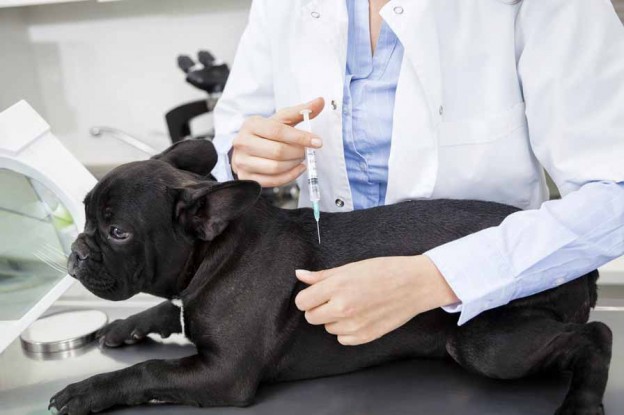
Dr James Crowley shares his expert advice on identifying and treating doggy allergic skin disease.
Allergic skin disease is extremely common in companion animal medicine. Dogs can suffer from multiple allergies and one of the most common allergies is Atopic Dermatitis.
Atopic dermatitis is a chronic skin condition seen mainly in dogs, although it can be seen in cats and other domestic pets. It is caused by immunological hypersensitivity to common substances in the environment such as house dust mites, pollens, grasses, fleas and moulds. The exaggerated immune response to these allergens results in chronic irritation and inflammation of the skin, self-traumatisation and hair loss due to severe itchiness, skin thickening, hyperpigmentation and often secondary bacterial/yeast infections. The most commonly affected body parts include the feet, ears, face, trunk and underside.
Approximately 10 to 15 per cent of dogs suffer from atopic dermatitis. Most cases begin between the ages of one to three years. Due to the seasonal nature of many of the offending allergens, flare-ups may be seasonal, however as dogs age they can be affected all year round.
Diagnosis
Diagnosis is based primarily on the clinical history of the animal, the physical examination performed by the veterinarian and exclusion of other diseases.
Flea allergy, food allergy, mite infestations and bacterial/fungal infections can also cause itching, scratching and hair loss. Veterinarians routinely perform simple in-house tests such as skin scrapes, sticky tape preps and impression smears to exclude skin infections. Adequate flea control will help to exclude fleas as a possible cause and food elimination trial diets are usually used to exclude food allergies.
Management
Atopic Dermatitis is a chronic relapsing skin disorder that must be managed throughout a dog’s life. There is no cure unfortunately, but rather, as veterinarians we must develop a management plan that suits the dog and its owner. The general aim is to manage the itch and inflammation due to the allergy while improving skin barrier function to reduce moisture loss and allergen absorption through the skin.
Allergen specific immunotherapy
Intradermal skin testing can be performed to identify offending allergens. Customised vaccines are then developed to desensitise dogs to specific allergens. These vaccines are very safe and give the best chance for long-term control whilst reducing the need for other long-term treatments. A veterinary dermatologist will typically perform intradermal skin testing and the owners taught to administer the vaccines at home. Unfortunately, the vaccines do not work for all dogs. However, approximately 50 to 60 per cent of patients achieve good control.

Shampoos, conditioners and moisturisers
Atopic dogs should be bathed every four to 14 days. The aim is to remove allergens from the skin (before they can be absorbed) and hydrate the skin and help prevent secondary infections. A myriad of products are available with a wide range of active ingredients.
Essential fatty acid supplements
Atopic dogs have a defective skin barrier due to lipid dysfunction causing increased permeability and absorption of allergens. Supplementing these animals with essential fatty acids can improve skin barrier function to reduce the itch and dose or frequency of other medications.
Dietary management
A balanced diet should not be ignored for dogs with Atopic Dermatitis. Some dogs may have a concurrent food allergy, which requires specific diets devoid of certain ingredients.
Strict flea control
Atopic dogs are prone to flea infestations that can complicate the skin complaint, so strict flea control is crucial.
This story was originally published in the October 2015 issue of Dogs Life. Subscribe to the magazine here.







